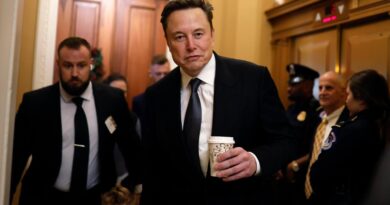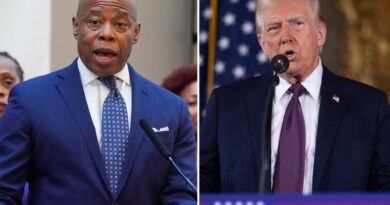Trump’s Swift Start: But a Flawed Deportation and Other Missteps May Challenge His Leadership

In routine circumstances, a message from President Trump indicating that a conversation with Israeli Prime Minister Benjamin Netanyahu was positive would typically be acknowledged and swiftly forgotten.
After all, these nations share a close alliance, and their leaders have consistently collaborated on countering Hamas and mitigating Iran’s influence, so a friendly call wouldn’t typically be newsworthy.
However, with challenges surfacing from all angles around the White House, nothing can be considered a given, even a conversation with an ally.
This is why the president’s message provided a bit of relief from the prevailing narrative that he is surrounded by turmoil.
“I’ve just spoken to Prime Minister of Israel, Bibi Netanyahu, regarding various topics including trade, Iran, etc.,” Trump stated.
“The conversation was very productive — We are aligned on every issue.”
Phew!
Now, back to our usual chaos.
It’s difficult to recall, but Trump initially embarked on his presidency with such vigor that Democrats and the media — essentially two sides of the same coin — were left feeling like mere onlookers.
Prominent business leaders from the U.S. and around the globe flocked to Mar-a-Lago before the inauguration to express their support and commit hundreds of billions of dollars in investments in America.
A Strong Beginning
Unlike his first term, during which he often appeared restless as the newcomer in Washington, the president seemed composed and focused as he assumed office, rapidly implementing a series of executive orders and policies.
He was clear on his objectives, and even though some Cabinet selections were somewhat unconventional, he successfully secured confirmation for everyone he nominated.
By any standard, it was a substantial and successful beginning.
The inclusion of Elon Musk added an invigorating dimension to the otherwise mundane tasks of budget cuts.
Yet a mere three months later, those promising days feel like a distant memory, as the president now faces significant tests to his leadership.
The most significant challenge is self-inflicted, with an admitted agent of chaos having overstepped his boundaries.
The sheer volume of issues is one aspect, but more importantly, Trump’s aggressive initiative to impose tariffs on nearly every country in an attempt to rectify trade imbalances has taken many by surprise.
This has rattled numerous economies — including our own.
The fallout is unsettling Wall Street and inciting fears of both recession and inflation.
Trump’s criticism of Federal Reserve Chairman Jay Powell sent the markets into a tizzy on Monday, positioning the Dow Jones for a disappointing record — the worst April since the Great Depression.
Although the market rebounded and surged on Tuesday, there are no indications of enduring stability.
A delegation from Japan sought a swift resolution on reciprocal tariffs but reportedly departed Washington empty-handed, citing complaints that Trump’s negotiators kept altering their demands.
What begins on Wall Street doesn’t remain confined there, and with millions of retirement funds diminishing and household budgets tightening, polls suddenly indicate declining support for Trump’s economic management.
Considering that the previous administration’s failures in this area were instrumental to Trump’s election victory, he risks eroding public trust on a fundamental issue.
Another critical issue is the tumultuous tenure of Defense Secretary Pete Hegseth, the most overworked member of the Cabinet.
His flawed Signal app message to officials regarding a pending attack on the Houthis last month inadvertently included a journalist, and new revelations suggest there was a second leak of the same confidential information to his wife, brother, and personal attorney, among others.
While Hegseth responded by disparaging “disgruntled former employees,” the prevailing impression is that he has not yet established himself and has limited room for mistakes.
Failed Deportation
Controlling border security is an area where the president has made remarkable strides, with the disparity between the number of illegal crossings under his administration compared to Joe Biden’s administration being unmistakably evident.
However, halting the influx was merely the first step; candidate Trump promised further action would follow — deporting criminal migrants whom Biden allowed entry.
While the effort and intent are evident, federal courts are obstructing the president’s agenda, and the administration appears to have bungled a test case.
They deported Kilmar Armando Abrego Garcia to a prison in El Salvador despite a judicial directive stating he could be sent to anywhere except his home country due to death threats.
Unfortunately, officials convoluted the narrative by presenting two contradictory defenses.
Initially, they claimed he was sent due to an “administrative error,” but then insisted he was dispatched to El Salvador in accordance with the law.
Which version is correct?
While Democrats and their media allies rally around this case as if the deportation of a known criminal migrant represents a pivotal civil-rights issue, it’s unlikely the outcome will undermine Trump’s position on border security.
Instead, it demonstrates that the White House requires a more focused approach and must maintain consistent messaging to succeed.
A similar trend is emerging in Trump’s critical efforts to hold top universities accountable for their failure to safeguard Jewish students against antisemitic harassment.
He made quick headway with his crackdown on Columbia University, where he froze $400 million in grants and contracts until the university agreed to implement significant changes.
Columbia acquiesced, setting a standard for the president’s strategy to establish similar arrangements with up to 60 elite institutions.
Yet the White House then confronted a self-imposed obstacle.
A letter the administration issued to Harvard detailing extensive demands was sent prematurely and later withdrawn.
Harvard capitalized on the opportunity and filed a lawsuit against the administration, transforming it into a focal point for a resistance movement seeking guidance.
Vulnerabilities for Criticism
Even in relation to Israel, Trump’s assertion that he and Netanyahu are “on the same side of every issue” signifies a shift regarding Iran.
Trump delivered an unwelcome surprise to Netanyahu by informing him that the U.S. was initiating discussions with Iran.
The Israeli leader had anticipated a joint military initiative to prevent the regime from developing nuclear weapons.
Trump not only dismissed that proposal but also further complicated matters by commencing the discussions and providing inconsistent accounts of his firm stance.
He publicly claimed that Iran would face military action if it did not comply with demands regarding its nuclear program, but privately indicated that if Iran did not dismantle its nuclear facilities, the U.S. and Israel would take action.
However, during the initial discussions, his envoy, Steve Witkoff, emphasized compromise and deliberated on the extent to which Iran could continue enriching uranium.
This echoed the 2015 agreement made by Barack Obama, which Trump correctly identified as untenable and from which he withdrew in 2018.
Although Witkoff later retracted his statements about enrichment, the situation remains unclear and the president’s final stance is ambiguous.
None of these administration mistakes are catastrophic, but they provide opponents with opportunities for criticism that, if left unaddressed, could jeopardize the GOP’s control of the House in the upcoming midterms.
The pressing question is whether Trump is sufficiently concerned to assert greater control over the administration and demand enhanced discipline from both his team and himself.



